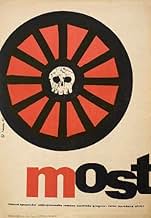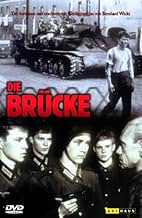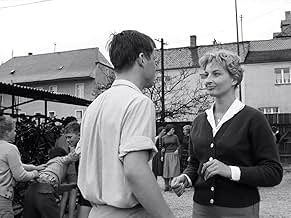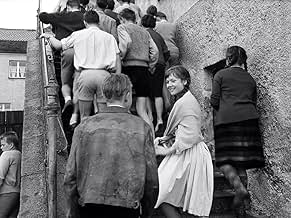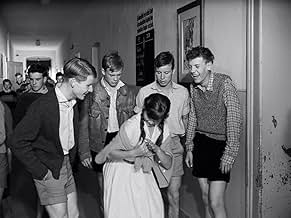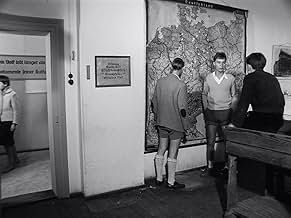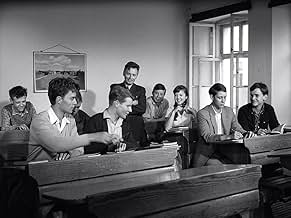IMDb-BEWERTUNG
7,9/10
9094
IHRE BEWERTUNG
1945, Deutschland liegt am Boden und niemand ist mehr da, um zu kämpfen, außer ein paar junge Spinte im Teenageralter.1945, Deutschland liegt am Boden und niemand ist mehr da, um zu kämpfen, außer ein paar junge Spinte im Teenageralter.1945, Deutschland liegt am Boden und niemand ist mehr da, um zu kämpfen, außer ein paar junge Spinte im Teenageralter.
- Für 1 Oscar nominiert
- 16 Gewinne & 1 Nominierung insgesamt
Volker Bohnet
- Hans Scholten
- (as Folker Bohnet)
Günter Hoffmann
- Sigi Bernhard
- (as Günther Hoffmann)
Empfohlene Bewertungen
I lived through that time, I was seventeen, and I know fourteen year olds were fighting to the last " boy ". The realism of this film still takes me back to '45. It happened that way.
German war drama from Deutsche Film Hansa and director Bernhard Wicki. In the waning days of WW2, a group of German high school friends all get drafted into the army, much to their excitement. However, with literally only a single day's worth of training, they are sent to their hometown to guard a small bridge until it can be destroyed by a demolition crew. The young men take their task very seriously, leading to tragic results
The 100 minutes film spends the first hour establishing the characters of each of the young men, so that the frenetic last act becomes even more devastating, as these are fully fleshed out individuals instead of the too-frequent ciphers and cliches found in many war films. The tone is distinctly anti-war, but the movie is never preachy, and the futility of their actions is made apparent naturally, without contrivance. The filmmaking in the final stretch of the film is ahead of its time in the use of rapid edits, traveling camera shots, and zooms. The movie was nominated for the Best Foreign Language Film Oscar (it lost to Black Orpheus). Recommended.
The 100 minutes film spends the first hour establishing the characters of each of the young men, so that the frenetic last act becomes even more devastating, as these are fully fleshed out individuals instead of the too-frequent ciphers and cliches found in many war films. The tone is distinctly anti-war, but the movie is never preachy, and the futility of their actions is made apparent naturally, without contrivance. The filmmaking in the final stretch of the film is ahead of its time in the use of rapid edits, traveling camera shots, and zooms. The movie was nominated for the Best Foreign Language Film Oscar (it lost to Black Orpheus). Recommended.
A group of young students are ordered to protect a strategically totally unimportant bridge at the end of the war. The initial euphoria changes suddenly to fright while the Allies are entering. Probably one of the essential and most important anti-war films ever. Wicki convincingly captured the atmosphere of the last war days, this constant indecision between fear and hope and forlornness. Especially well made are the psychological portrays of the boys, their every day life in school, at home, within the clique and the mixture of real dedication and adventure mentality which leaves them to look at the war partly as national duty and partly as a romantic game. But as soon as the war collides with the life of the boys, the contrast between those close-ups of round-eyed, innocent child's faces and the churned up mud of the battlefield, as well as the bookish discourses of "courage" and "cowardice" makes the absurdity of the war pretty damn clear. Indeed, war is a game, but harrowing, arousing and bitter which has lost all gaily playfulness.
We were shown this movie at school, so I always remembered it as a politically correct piece educational film - which it is, in a way. This is film with a clear purpose. It wants you to learn something. The amazing thing is that it is also a good film. Its message "War Is Bad" is brought across not so much by showing blood, death and destruction but by the means of classical tragedy: There are no "bad guys" in this film; on the contrary, most people try to do good, be humane. (E.g. the boys are told to guard the bridge in order to keep them away from the front.) But what they do results in disaster, because the evil is war itself.
This German contender for the Best Foreign Language Film Oscar is an unflinching war effort that obviously draws comparisons – in its narrative depicting the disillusionment experienced by a number of schoolboys-turned-soldiers – with ALL QUIET ON THE WESTERN FRONT (1930), albeit dealing with the subsequent world conflict. Though only rated * by the "Leslie Halliwell Film Guide", it boasts a favourable write-up therein – on the other hand, I was under the impression that it was given more than *** in the Leonard Maltin equivalent! For the record, it has received its due in "War Movies" – an oversized but appealing book on the subject owned by my father – and is even listed in the all-time top 3,000 movies ranked by the "Wonders In The Dark" website.
The acclaim this garnered upon release won Wicki the co-director gig on Darryl F. Zanuck's super production revolving around the D-Day landings THE LONGEST DAY (1962); his brief Hollywood tenure also comprised THE VISIT (1964) and, another WWII adventure, MORITURI (1965) – a distinguished actor in his own right, he is perhaps best-known for his supporting turn in Michelangelo Antonioni's LA NOTTE (1961). With respect to the film's cast, only the face of a youthful Fritz Wepper – future co-star of CABARET (1972) and the "Derrick" TV series – was familiar to this viewer. Oddly boasting no credits on the print I watched (except for the title and company credits!), this competed at the Oscars against Italy's THE GREAT WAR – a viewing of which followed in quick succession – that concerned itself, albeit on a vaster scale and in a serio-comic tone, with WWI but they were surprisingly defeated by the exotic French entry i.e. BLACK ORPHEUS.
The movie is basically divided into three parts: the first 40 minutes showing the boys in school; the next 30 illustrating their basic training and posting; and the last half-hour being devoted to the combat sequences. Most of the teenage boys are coming-of-age and experience their first sexual hang-ups before being sent to the front: a blond boy with the only female student in the class; another the salesgirl in his father's shop (who is also the boss' lover); and the cowardly Mayor's son towards the gymnasium instructor in a nearby girls' school. The battle scenes are certainly effectively rendered and appropriately harrowing, if occasionally over-the-top: a G.I., astonished to be confronted by a bunch of 16 year-olds, tells them to run off to their mothers but they find his condescending attitude insulting and he is literally gutted by their response!; an equally disdainful local, then, has his face blown off and body scarred by a backfiring bazooka, etc. The supreme irony of the film is that, while the boys' superior officer (who is himself shot almost instantly for apparent desertion by his own compatriots!) orders them to defend the expendable bridge ostensibly to keep the kids out of harm's way, the fact that the German forces intend blowing it up regardless so as to stem the Allied advance ensures that all but one of the fresh-faced soldiers sacrifice their lives to the fatherland unnecessarily!
The acclaim this garnered upon release won Wicki the co-director gig on Darryl F. Zanuck's super production revolving around the D-Day landings THE LONGEST DAY (1962); his brief Hollywood tenure also comprised THE VISIT (1964) and, another WWII adventure, MORITURI (1965) – a distinguished actor in his own right, he is perhaps best-known for his supporting turn in Michelangelo Antonioni's LA NOTTE (1961). With respect to the film's cast, only the face of a youthful Fritz Wepper – future co-star of CABARET (1972) and the "Derrick" TV series – was familiar to this viewer. Oddly boasting no credits on the print I watched (except for the title and company credits!), this competed at the Oscars against Italy's THE GREAT WAR – a viewing of which followed in quick succession – that concerned itself, albeit on a vaster scale and in a serio-comic tone, with WWI but they were surprisingly defeated by the exotic French entry i.e. BLACK ORPHEUS.
The movie is basically divided into three parts: the first 40 minutes showing the boys in school; the next 30 illustrating their basic training and posting; and the last half-hour being devoted to the combat sequences. Most of the teenage boys are coming-of-age and experience their first sexual hang-ups before being sent to the front: a blond boy with the only female student in the class; another the salesgirl in his father's shop (who is also the boss' lover); and the cowardly Mayor's son towards the gymnasium instructor in a nearby girls' school. The battle scenes are certainly effectively rendered and appropriately harrowing, if occasionally over-the-top: a G.I., astonished to be confronted by a bunch of 16 year-olds, tells them to run off to their mothers but they find his condescending attitude insulting and he is literally gutted by their response!; an equally disdainful local, then, has his face blown off and body scarred by a backfiring bazooka, etc. The supreme irony of the film is that, while the boys' superior officer (who is himself shot almost instantly for apparent desertion by his own compatriots!) orders them to defend the expendable bridge ostensibly to keep the kids out of harm's way, the fact that the German forces intend blowing it up regardless so as to stem the Allied advance ensures that all but one of the fresh-faced soldiers sacrifice their lives to the fatherland unnecessarily!
Wusstest du schon
- WissenswertesThe end credits suggest that the story relates to true events which supposedly happened on "April 27, 1945", but this specific story is fictitious, while the general use of teenage boys as soldiers in the last days of the Third Reich is accurate.
- PatzerWhen the boys are assembled at night, they are told they will be part of the 336th Division. That unit was destroyed and surrendered to the Soviets on the Eastern Front nearly a year earlier in 1944 and was never reformed.
- Zitate
Sigi Bernhard: Whoever defends one square foot of German soil defends Germany!
- Alternative VersionenAn English dubbed version was released in the USA in 1963.
- VerbindungenEdited into Bernhard Victor Christoph Carl von Bülow genannt Loriot (2008)
Top-Auswahl
Melde dich zum Bewerten an und greife auf die Watchlist für personalisierte Empfehlungen zu.
Details
- Laufzeit
- 1 Std. 43 Min.(103 min)
- Farbe
- Sound-Mix
Zu dieser Seite beitragen
Bearbeitung vorschlagen oder fehlenden Inhalt hinzufügen

